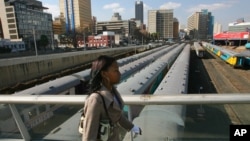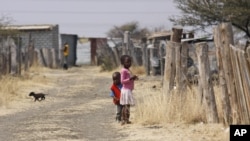JOHANNESBURG —
South African President Jacob Zuma won’t only be representing his nation at next week’s World Economic Forum in Switzerland -- he’ll be representing all of Africa.
Zuma has been appointed by the African Union to push the world’s top economies to focus on boosting Africa’s infrastructure. Experts say the state of the continent's roads, electrical grids and other fixtures are keeping Africa from realizing its potential. But with developed nations struggling with their own economic problems, it is unclear if Zuma's message will be heard.
Abundance amid poverty
Africa is the world’s poorest inhabited continent. But in many ways, it’s also the richest.
The continent is the world’s second most populous, with more than 1 billion people, many of them young. And the ground fairly teems with minerals and resources -- oil, natural gas, coal, gold, bauxite, platinum and diamonds among them.
But as Zuma plans to argue at the World Economic Forum in Switzerland, the continent’s poor infrastructure is seriously holding it back.
The United Nations has estimated that mineral-rich Congo, for example, has just 1,200 kilometers of good paved road in a nation the size of Western Europe. In Ethiopia, farmers grow plentiful crops when the rains are good, but nearly starve during droughts because they have no irrigation systems.
Even South Africa, the continent’s economic powerhouse, struggles to provide basic services like water and electricity to all of its nearly 52 million people.
These small things that Americans and Europeans take for granted are key to unlocking Africa’s potential, Zuma has said. South Africa has launched a major program to boost the nation’s infrastructure over the next 15 years.
South African foreign ministry spokesman Clayson Monyela says Zuma will preach that message at next week’s forum.
“One of the priorities for South Africa this year is in the context of our infrastructure development program, the 4 trillion rand [$449 billion] infrastructure development program for South Africa, as well as considering the fact that President Zuma has been appointed by the African Union to champion infrastructure development on the continent," said Monyela. "That remains a key priority for us and it will be highlighted in Davos with a view to getting partners and other potential investors to come on board.”
Africa and the global economy
Michael Lalor, the Africa Business Center leader for international accounting firm Ernst and Young, says the company has identified three priorities for Africa: improving infrastructure, accelerating regional integration and creating a more investment-friendly environment.
None of those goals are new this year, but there are new economic crises afoot -- notably, political clashes in the United States over the huge national deficit and the Republican Party's demands for cuts in government spending.
Lalor says issues like those are likely to take center stage at next week's forum -- and asserts that is not bad news for Africa.
“Clearly, there are issues in the global economy elsewhere in the world that are far more immediately pressing than most, if not any, of the issues in Africa," he said. "I think we also need to be aware that increasingly African economies are tied into the health of the global economy. So in many ways, I don’t think we should see it as a threat if Africa is not right up high on the agenda at this year’s World Economic Forum. I think it’s in Africa’s best interests for us to be sorting out problems in other areas of the global economy, both emerging markets and some of the developed markets.”
The World Economic Forum opens Tuesday in Davos, Switzerland.
Zuma has been appointed by the African Union to push the world’s top economies to focus on boosting Africa’s infrastructure. Experts say the state of the continent's roads, electrical grids and other fixtures are keeping Africa from realizing its potential. But with developed nations struggling with their own economic problems, it is unclear if Zuma's message will be heard.
Abundance amid poverty
Africa is the world’s poorest inhabited continent. But in many ways, it’s also the richest.
The continent is the world’s second most populous, with more than 1 billion people, many of them young. And the ground fairly teems with minerals and resources -- oil, natural gas, coal, gold, bauxite, platinum and diamonds among them.
But as Zuma plans to argue at the World Economic Forum in Switzerland, the continent’s poor infrastructure is seriously holding it back.
The United Nations has estimated that mineral-rich Congo, for example, has just 1,200 kilometers of good paved road in a nation the size of Western Europe. In Ethiopia, farmers grow plentiful crops when the rains are good, but nearly starve during droughts because they have no irrigation systems.
Even South Africa, the continent’s economic powerhouse, struggles to provide basic services like water and electricity to all of its nearly 52 million people.
These small things that Americans and Europeans take for granted are key to unlocking Africa’s potential, Zuma has said. South Africa has launched a major program to boost the nation’s infrastructure over the next 15 years.
South African foreign ministry spokesman Clayson Monyela says Zuma will preach that message at next week’s forum.
“One of the priorities for South Africa this year is in the context of our infrastructure development program, the 4 trillion rand [$449 billion] infrastructure development program for South Africa, as well as considering the fact that President Zuma has been appointed by the African Union to champion infrastructure development on the continent," said Monyela. "That remains a key priority for us and it will be highlighted in Davos with a view to getting partners and other potential investors to come on board.”
Africa and the global economy
Michael Lalor, the Africa Business Center leader for international accounting firm Ernst and Young, says the company has identified three priorities for Africa: improving infrastructure, accelerating regional integration and creating a more investment-friendly environment.
None of those goals are new this year, but there are new economic crises afoot -- notably, political clashes in the United States over the huge national deficit and the Republican Party's demands for cuts in government spending.
Lalor says issues like those are likely to take center stage at next week's forum -- and asserts that is not bad news for Africa.
“Clearly, there are issues in the global economy elsewhere in the world that are far more immediately pressing than most, if not any, of the issues in Africa," he said. "I think we also need to be aware that increasingly African economies are tied into the health of the global economy. So in many ways, I don’t think we should see it as a threat if Africa is not right up high on the agenda at this year’s World Economic Forum. I think it’s in Africa’s best interests for us to be sorting out problems in other areas of the global economy, both emerging markets and some of the developed markets.”
The World Economic Forum opens Tuesday in Davos, Switzerland.

